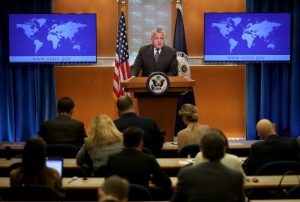
Acting U.S. Secretary of State John Sullivan speaks on the release of the Reports on Human Rights Practices on April 20, 2018
Photo: Photo by Win McNamee/Getty Images
The United States State Department’s Bureau of Democracy, Human Rights and Labour (DRL) in Washington DC released its annual report, The Status of Global Human Rights, on April 20. The report identifies China as being one of four countries (China, Russia, Iran and North Korea) notable for major human right abuses, labelling its government as “force of instability”.
The 42nd annual report looks at almost 200 countries and territories and is considered the most comprehensive present day account of the global human rights situation. On its release, Acting Secretary of State John Sullivan said, “We’re particularly concerned about the efforts of Chinese authorities to eliminate the religious, linguistic, and cultural identities of Uighur Muslims and Tibetan Buddhists, as well as restrictions on the worship of Christians.”
The report describes China as an authoritarian state where the government is responsible for arbitrary detention, torture and executions without due process, among other human rights abuses. It asks specific questions which include the whereabouts of the 11th Panchen Lama, Gedhun Choekyi Nyima (the second-most prominent figure in Tibetan Buddhism, after His Holiness the Dalai Lama, please see our article Tibet’s Missing Panchen Lama turns 29); prison conditions and torture methods employed by the authorities; arbitrary arrests; unfair public trials; the state of political prisoners and freedom of expression including that of the press.
Freedom House, the independent watchdog organisation dedicated to the expansion of freedom and democracy around the world, published their report Attacks on the Record: The State of Global Press Freedom, 2017-2018 on April 25. The report reflected similar findings to the DRL report saying, “China’s authoritarian regime has become increasingly repressive in recent years. The ruling Chinese Communist Party is tightening its control over the media, online speech, religious groups, and civil society associations while undermining already modest rule-of-law reforms.” The report continued, “Internet censorship and surveillance reached new heights in China as a Cyber security Law came into effect in June 2017, alongside other new regulations restricting online communications and the use of virtual private networks (VPNs) […] Numerous bloggers and social media users were arrested or sentenced to prison for critical online comments or efforts to share information about human rights.”




 Print
Print Email
Email